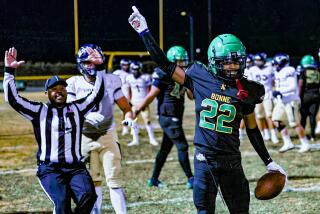The Real Culprits Get Away
- Share via
The penalties imposed by the National Collegiate Athletic Assn. on the football program at Southern Methodist University in Dallas are the harshest ever levied on a college caught cheating in athletics. But they were not as severe as they could have been, and the real culprits--the overzealous alumni and team boosters involved in the scandal--apparently will wriggle out of it without a scratch.
The NCAA has decreed that SMU will not be allowed to field a football team this fall, and will be allowed to play only a severely limited football schedule in 1988. Under stiff new regulations that the NCAA adopted a few years ago during a wave of major scandals in college athletics, SMU could have been barred from football competition for two years. Even the limited penalties will hurt, however. Among the games that SMU must now cancel is a contest against Notre Dame that, if televised, could have earned the school up to $250,000 in revenue. And shutting down a football program for even one year can weaken it for five to ten years afterward.
Those who argued that the maximum penalty should be imposed on SMU point to the school’s repeated violation of NCAA regulations since 1981, particularly the fact that the most recent infractions--secret payments of money to several football players by team boosters--took place while the school was already under limited penalties for previous rule violations. Even the NCAA’s formal report on SMU’s athletic problems referred to the school’s record as “nothing short of abysmal.”
Still, while severe punishment was clearly in order, one cannot escape the feeling that at least some of the villains in this sad situation are getting off easy. A fine college has had its reputation tainted, affecting the vast majority of administrators, faculty members and students who were not involved in the scandal. A key reason for this was the decision by SMU and the NCAA to keep secret the names of most of the football players who took money, and of the boosters who made the illicit payoffs. In the case of student athletes who succumbed to temptation, that is perhaps understandable. But the team boosters who corrupted them are adults who should have known better and deserve some penalty for what they did. They apparently broke no laws with their sleazy activities, so the only setback that they might suffer is the embarrassment of having their names made public. The fear of public disapproval just might help prevent future athletic scandals at other colleges.
More to Read
Go beyond the scoreboard
Get the latest on L.A.'s teams in the daily Sports Report newsletter.
You may occasionally receive promotional content from the Los Angeles Times.










